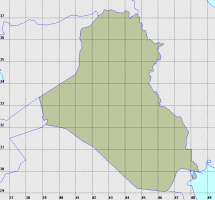

 (AINA) -- Earlier reports of Assyrian inclusion in the upcoming census had buoyed Assyrian hopes that the upcoming Iraqi census would be the first true accounting of Assyrians in the modern history of Iraq (AINA story). In a major blow to Assyrian aspirations for full and comprehensive participation in the new government of Iraq, however, reports have surfaced that the upcoming Iraqi census will exclude Iraqi expatriates. The new census is tentatively planned to be carried out in one day by an army of school teachers on October 12 (story). Presumably, due to logistical difficulties, the nearly 4 million estimated Iraqi expatriates scattered throughout the world will be deliberately excluded.
(AINA) -- Earlier reports of Assyrian inclusion in the upcoming census had buoyed Assyrian hopes that the upcoming Iraqi census would be the first true accounting of Assyrians in the modern history of Iraq (AINA story). In a major blow to Assyrian aspirations for full and comprehensive participation in the new government of Iraq, however, reports have surfaced that the upcoming Iraqi census will exclude Iraqi expatriates. The new census is tentatively planned to be carried out in one day by an army of school teachers on October 12 (story). Presumably, due to logistical difficulties, the nearly 4 million estimated Iraqi expatriates scattered throughout the world will be deliberately excluded.
Assyrians (also known as Chaldeans and Syriacs) are the indigenous Christian people of Iraq and have a continuous history in Iraq spanning over 6700 years. During the past Baathist regime, Assyrians were denied recognition as a people in official censuses. Over 200 Assyrian villages were razed by the government in an attempt to resettle Assyrians into urban areas where they could be more easily Arabized. Following the first Gulf War, Assyrians in the northern UN administered "Safe Haven" did not fare better. Here as well, Assyrians were denied recognition as a people, referred to instead as "Christian Kurds." Moreover, over 50 villages were occupied in whole or in part by Kurds with ties to the Kurdistan Democratic Party (KDP).
A deliberate policy to exclude Iraqis in the Diaspora from the census has a disproportionately adverse affect on Assyrian population statistics at a very critical time in the lead up to general elections. Although hard figures are difficult to quote since previous censuses deliberately excluded Assyrians, it is widely believed that 30-40% of Assyrians have emigrated out of Iraq since the 1970's. As an example, in the US it is estimated that 80-90% of Iraqi Americans are Assyrian. According to one analyst, "For Assyrians, losing 30-40% of their numbers prior to the establishment of the National Assembly is a potential disaster. The first National Assembly will establish the first basic principles from which a new Iraqi society and government will emerge. If we are shut out in the early stages, it will be an uphill battle to regain full participation." The reasons for the overwhelmingly lop-sided representation in the Diaspora are numerous but, in the words of an observer, "boil down to disproportionate persecution leading to disproportionate emigration."
The proposed exclusion of Iraqi expatriates impacts Iraqis from across the religious and ethnic spectrum. However, no community is impacted to the same extent as Assyrian Christians. As one Assyrian political leader noted, "It would be inconceivable and downright dangerous for the government to virtually erase the existence of 30-40% of Shiites, Sunnis, or Kurds. But, for Assyrians, this is the reality of the government census proposal."
Assyrians are keenly aware of the delicate situation surrounding the nascent Iraqi government. Assyrians, perhaps more than any other group, are heavily invested in the prospects for a better, more democratic Iraq. With a violent insurgency and isolation from surrounding regimes afraid of democratic progress, Assyrians are loathe to contribute to a further weakening or condemnation of the government. However, as one activist noted, "at some point we have to ask what indeed are we supporting? If there is a policy whose outcome is the undercounting of our people, then it is democracy itself that is under attack. We cannot support such a policy."
Various suggestions have been proposed to alleviate the disproportionate impact on Assyrians. One such suggestion has been to establish Consulates in major urban areas in Europe and North America where sizeable Iraqi communities exist. As one analyst suggested "Although they may not be able to send out school teachers to every home in the Diaspora, at least those Iraqis who want to be counted would have that option. The government could follow up the process with a full accounting in later months." Such a good faith effort would help to lessen the impact on the Assyrian population and send a clear signal to the community that there is not a deliberate intention to undermine the Assyrian community's numbers. In the US, for example, a minimal effort of establishing Consulates in San Diego, San Jose, Chicago, Detroit, and New York would help to reach the major concentrations of Iraqi Americans. The personnel associated with these Consulates naturally would need to be representative of the make up of the communities in those areas.

or register to post a comment.